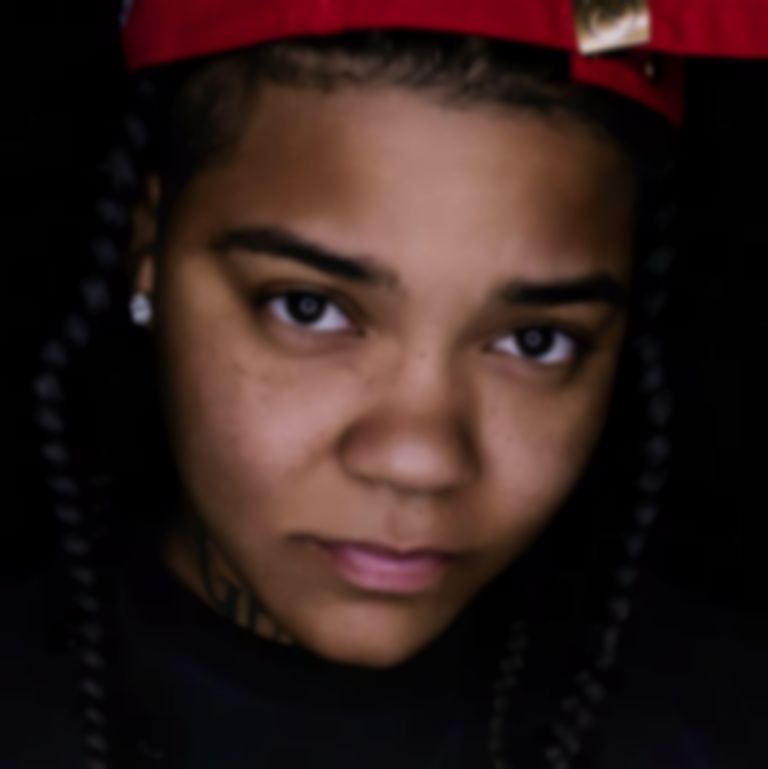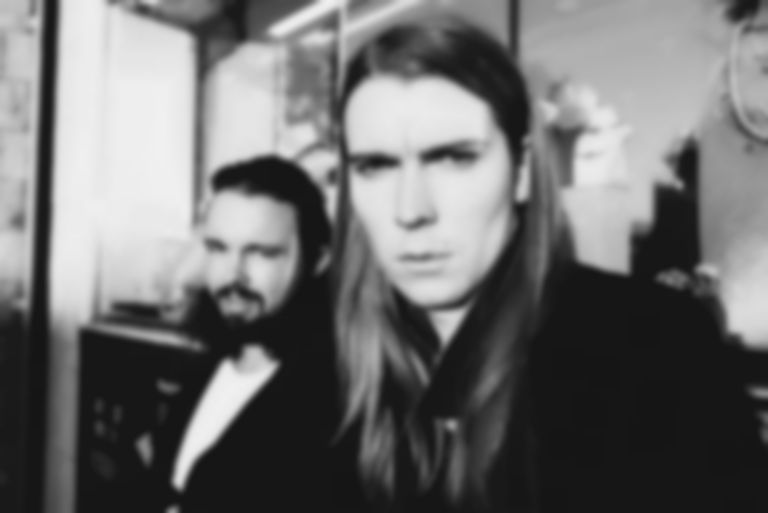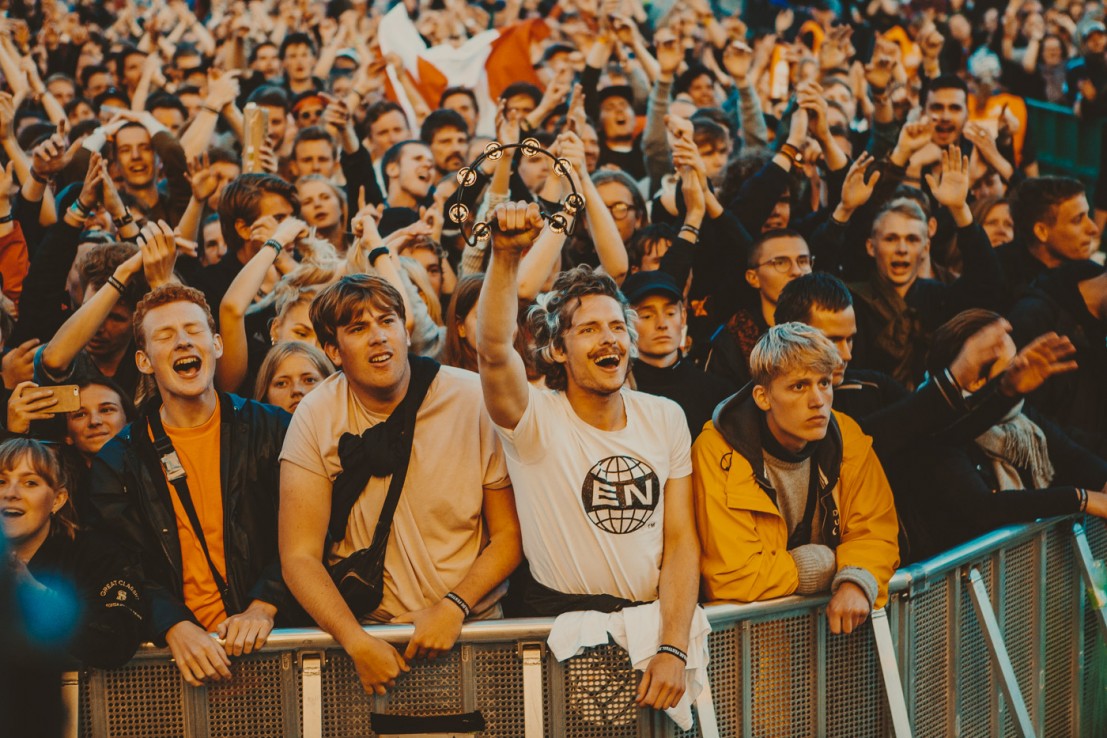A new role
I'm now New Music Editor at The Line of Best Fit. Take a look at the pieces I've written here.
Great Danes and Nordic talent shine at Roskilde, Northern Europe’s biggest music festival
A festival review I wrote in summer 2017 for The Line of Best Fit. See it on their website here.
 |
| All photography by Kimberley Ross |
The 47th edition of the non-profit festival showcased a host of Nordic acts alongside global big-hitters. We give you the lowdown on how we survived and who we caught this year.
Roskilde's lineup is typically very diverse, proven yet again this year with 183 acts of countless genres appearing across 9 stages all-in-all. Foo Fighters, Arcade Fire, Royal Blood and Father John Misty gave crowds at the iconic Orange Stage their fundamental arm-swaying mass festival sing-a-longs. Lorde, The Weeknd and Solange injected some polished pop into the weekend while Young M.A, Gucci Mane, Princess Nokia and Ice Cube represented intergenerational rap. As would be expected, Roskilde always has a strong showcase of Nordic acts (almost 40% of all acts, in fact), with Sigrid and Icona Pop drawing huge crowds, as well as home-grown Danish talent in the form of Emil Stabil and Trentemøller.
How does Roskilde Festival work?
Early every summer, the small harbour city of Roskilde plays host to a non-profit, carbon-conscious, community-focused festival. The population of the festival - 130,000 - would make it the fourth largest city in Denmark for the eight day event. The 'core' festival events take place across the latter part of the week from Wednesday evening to Saturday night, with the first half of the festival showcasing rising stars, newcomers and DJ sets across three of its smaller stages. Acts start from midday and last until past 3am.
Getting around at Roskilde
Being a tourist in Denmark
You'll no doubt be travelling through Copenhagen on your route to and from Roskilde, which offers the perfect opportunity to explore the city's world-renowned new Nordic cuisine, stunning royal palaces, Lego-esque Nyhavn port, freetown Christiania and Danish design boutiques. If you're in a fragile post-festival haze and just need some good hygge, you can still low-key immerse yourself in Copenhagen's culture by weighing in on various smørrebrød toppings and some innovative hair-of-the-dog Mikkeller beers. Oh, and the Little Mermaid statue is possibly one of the most overrated tourist attractions in Europe.
The food at Roskilde
This year, the 145 food stalls on site used over 90% organic produce. While this is quite amazing to us Brits, Copenhageners are slightly more accustomed to organic food as the norm, as it makes up three quarters of the food served in the city's public institutions. The buzz of the festival's food scene this year was the Crick'it stand: the brainchild of Danish food entrepreneurs who see high-protein, near-carbon-neutral bugs as the future of eco-friendly nutrition. Cricket pesto, moth larvae mayo and 15 cricket lemonade (does what it says on the tin) were on the menu for the festival's notoriously open-minded punters. Gorm's freshly baked gourmet pizza, burritos, Thai street food, falafel plates and so many other world cuisines were on offer for those who prefer their food fly-free.
Our tips for surviving at Roskilde in 2018
The campsites are the best places to find a party after the live music stops (or any time really!), and Dream City encapsulates the festival's renowned 'orange feeling'. It's where festival-goers create themed camp communities and neighbourhoods with unique activities such as Quidditch tournaments at Camp Harry Potter, glitter wrestling at the LGBTQ Unicorny Camp, and a hog roast at the Amish camp. There's also the hugely popular annual naked race around Dream City on Saturday every year which is absolutely worth a watch. Elsewhere, the Art Zone is where international artists create and display their work, Rising City hosts engaging talks and events, the new KlubRÅ area holds secret DJ sets, and you can watch or partake in some basketball, skateboarding or BMXing at Street City. Oh, and the Danish are among the tallest people in the world, so if you're vertically challenged, make sure you make it early to your favourite sets to secure a good spot.
Is Denmark expensive?
There's no beating about the bush - Denmark is pricey. It isn't on the euro, but the krone (crown). Roskilde Festival was cashless this year, with all stalls instead accepting plastic or the festival's cash card system, where cash is loaded onto a contactless card and topped up when needed. This is an absolute blessing if you get a fee every time you use your bank card in a foreign country, and means no waiting in ATM queues or coins weighing you down for the whole festival. It's possible to eat for cheap at Roskilde too: some food stands offer filling meals for 50 krone (about £6), but if you're on a tight budget it's a good idea to bring some of your own snacks and booze. Volunteering at Roskilde is a sociable and cost-effective way to go on a shoestring. The 32,000 volunteers each year are hugely valued and are at the heart of the whole festival's operation, and get a free ticket in return for a few shifts.
How do I get to Roskilde Festival?
Roskilde is handily just 20 miles west of Copenhagen, which is unsurprisingly really easy and quite cheap to fly to from many cities around the UK and around the world. From the airport it's just a quick train to the centre of Copenhagen, another to the city of Roskilde, then you have a choice of either the frequent shuttlebuses or a train to take you straight to the site. There'll be plenty of orange-clad volunteers around at Roskilde station to ask for help. In general, if you get lost or you're unsure, the festival and its location is really well-known around Copenhagen. Pretty much everyone in Denmark speaks incredibly good English and typically are really nice people, so ask away.
Where can I stay at Roskilde Festival?
The festival has a lot of space for campers, and camping is included in the full ticket. You can choose where you lay your tent depending on the vibe you want: from 'silent and clean' camping for a good night's sleep, to the party epicentre of Dream City. Roskilde also offers pre-pitched tents for an extra fee if you're travelling far and don't want the faff of bringing a tent.
Who we saw this year...

Angel Olsen
Topping everyone's list of must-sees at Roskilde, Olsen brought her sarcastic wit and Dolly Parton vibrato to a huge crowd at Roskilde. Her stunning warbling vocals have been lent to Bonnie "Prince" Billy records - but with two solo albums under her belt released through Jagjaguwar and with her suited-up band and chic mini-dress, her festival sets this year are proving how much she's settling into her distinct style and persona.
Alex Cameron
If you heard that Alex Cameron's high-concept stage persona is that of a failing entertainer, it's hard not to think up some sort of Alan Partridge-esque character. When you see that the whole band is sporting high-waisted '90s jeans, it's even more of a stubborn preconception to bust. But his aesthetic and awkward dance moves work in a symbiotic way with his effortless breathy vocals and endearing conversation between songs ("It's important to keep hydrated. Make sure you drink lots of water, guys"). Signed to Secretly Canadian, the Australian's live set is steeped in dejection and defeat with a vein of facetiousness running throughout ('there's this woman on the internet/even if she's just some Nigerian guy'). The dark and arty Gloria stage suited his set perfectly, and his performance of the gloomy, minimal "She Takes Care of Business" was goosebump-inducing.
Jagwar Ma
It was a seriously tough set time for Jagwar Ma, clashing with both Foo Fighters and Lorde, but the rag-tag bunch who showed up at the intimate Avalon tent were treated to the Aussie trio's woozy vibes, synth loops and jangly guitars. The Brian Wilson-esque vocals of "Come Save Me" brought the sing-a-long that was made for uplifting the moods of a tent full of damp, cold Danes. The set delved through their contemporary psychedelia and Madchester-influenced electro, at one point morphing into a beat that was so Underworld, I thought singer Gabriel Winterfield would burst into 'lager lager lager.'

Princess Nokia
“I’m a shape-shifting bitch,” Princess Nokia snarls in "Brujas", proving this as she bounced between rapping and singing skilfully: rap-goddess one moment and rock star stage presence the next as she crowdsurfed and spurred an unexpected mosh pit at the Apollo stage. 25-year-old Destiny Frasqueri, AKA Princess Nokia is establishing herself as a champion of the NYC underground rap scene, independently self-releasing her EP and mixtapes.
Solange
Without doubt the slickest set to materialise in Roskilde, Solange and her band were placed there on a velvet cushion by the same angelic being that created the celestial four-part harmonies in "Cranes in the Sky". The sleek yet subtle full-band dance routines, matching pillar-box red outfits and minimal, polished pop tunes soothed away any delicate heads from the night before.

Sigrid
Despite her early set time, Sigrid drew the crowds for her sprightly Scandi-pop ditties, and wins the title of looking the most genuinely chuffed to play Roskilde. At the tender age of 20, the Norwegian has already had huge success with "Don’t Kill My Vibe", and with her endearingly youthful pop and pure voice, there’s a lot more to come from Sigrid.
Icona Pop
Roskilde has seen them through since the beginning, hosting the peppy Swedish twosome on the up-and-coming talent stage back in 2012 before their huge breakthrough hit with Charli XCX on "I Love It", and support slots with pop giants such as Katy Perry and One Direction. Icona Pop injected the perfect amount of energy into a tricky 2am slot, with the crowds singing along to what was basically the story of a lot of their Roskilde experiences (treating weekdays like the weekend, drunken nights, blurred memories and cracked phone screens, likely from the one million litres of beer consumed at the festival).
Mammút
The Icelandic five-piece’s chilling art-rock soundscape suited the Danish weather on Friday at the Pavilion stage. They were showcasing a change in pace with their first English-speaking album, Kinder Versions. With her strong-yet-breathy vocals, it’s no surprise that Mammút's lead singer Kata is the daughter of a former Björk-bandmate, but she took surprising turns to more animalistic and guttural sounds on songs like "Walls".

Priests
Walking onto the Pavilion stage looking like Dolly Parton in an all-white ensemble involving cowboy boots and a fringed jacket doesn’t seem very DC punk, but as soon as lead singer Katie Alice Greer shouted the politically-charged opening bars alongside prickly rockabilly guitar riffs, it became clear the playful all-American aesthetic has much darker and more topical undertones. Priests are true to their DIY ethic, having released their debut LP Nothing Feels Natural on their self-run label Sister Polygon Records.
Roskilde 2018 will take place from 30 June - 7 July 2018 and tickets will be on sale in the Autumn from roskilde-festival.dk
Tags:
festivals,
live music,
music,
new music,
TLOBF
Ten acts you can’t miss at Roskilde 2017
Written in summer 2017 for The Line of Best Fit - view it on their website here.
Just west of Copenhagen, the Danish city of Roskilde hosts its eponymous 47th festival this weekend
The 130,000 punters in attendance will be treated to a truly global pick of 180 music acts from 32 countries at the entirely non-profit event. Big-hitters including Foo Fighters, Arcade Fire, Justice and The XX head up the weekend's bill, and they're just the tip of the multi-genre iceberg.
Among the Nordic talents and established acts joining international giants across nine stages, here are our tips for the best sets to catch this year.
aYia
The dark wave electro trio native to Reykjavik is signed to Iceland's prominent Bedroom Community label. Fronted by poet Ásta Fanney Sigurðardóttir and her haunting vocals, their set is bound to be filled with mysterious synths and hushed tones. Catch them on Thursday at 8pm on the Gloria stage.
Icona Pop
Since Roskilde showcased the Swedish pop duo back in 2012 on their up-and-coming talent stage, Icona Pop's major breakthrough came with their collaboration with Charli XCX on 'I Love It'. The chart-topping single catapulted them into pop's elite echelons, having held support slots for Katy Perry, One Direction and Miley Cyrus. They can also cite Barack Obama as a fan. Head to the Arena stage on Friday at 2am and you never know, you might see him there.

Young M.A
The 24-year-old Brooklyn MC is taking over the US rap scene with her brash bars. An independent artist since self-funding her own recording studio with local record producers, her RIAA two times Multi-Platinum Award record 'OOOUUU' has been remixed by Nicki Minaj, The Game and ASAP Ferg. Keep your fingers crossed you'll catch her freestyling or rapping a cappella at the Apollo stage on Wednesday at 5:15pm.
Jagwar Ma
Bringing their contemporary take on psychedelia to Roskilde, we can't wait to catch the Australian trio's woozy vocals, jangly guitars and synth pop loops. Whatever the Danish weather brings, Jagwar Ma will deliver a glimpse of Aussie sunshine to their set on Friday at 11pm on the Avalon stage.

Mammút
The Icelandic five-piece recently released their third album, Kinder Versions, although it was their debut in English language after signing with Bella Union. With their shimmering, shapeshifting rock numbers, it isn't a surprise to learn that Mammút's singer Katat is the daughter of a Birgir Mogensen, a former bandmate of Björk in her pre-Sugarcubes incarnation KUKL - See them on Friday at 8:15pm at the Pavilion stage.
_768_512_80gaus-20.jpg)
Lorde
The Grammy-winning New Zealander just released her second album, Melodrama, which she co-produced and co-wrote, four years after her debut. Taylor Swift's new best pal puts a darker spin on traditional pop with her lyrics often critiquing mainstream culture. Her festival season included huge stages at Glastonbury and Coachella, so snap up the chance to see her on Friday night at 11:30pm on the Arena stage.
Emil Stabil
A stand-out of Roskilde's showcase of the Nordic countries' vibrant hip hop and rap scene is platinum-selling Danish rapper Emil Stabil. He launched into SoundCloud fame in 2014 and has since started up his own hip hop label, Lil Label, as part of a collective. Emil is becoming renowned for his charisma on stage, and joining him on Saturday at 2pm on the Arena stage will be an array of guests including Norwegian trap duo $ushi x Kobe, Estonian rapper Tommy Cash and Dutch rap sensation Lil’ Kleine.

Angel Olsen
Olsen has lent her mesmerising vocals to Bonnie "Prince" Billy records before releasing two solo albums through Jagjaguwar. Her love of "very dingy sounding things" and sarcastic wit perfectly balances out her ethereal tone and Dolly Parton-esque controlled vibrato warble. Her full-band show is on Friday on the Avalon stage at 5pm.

Princess Nokia
Taking over Europe's festival circuit by way of the NYC underground, Princess Nokia is 25-year-old Destiny Frasqueri. The multifaceted DIY rapper and singer has two mixtapes and an EP under her belt, as well as hosting a podcast, Smart Girl Radio, which she calls a 'safe space for wonderful women'. See her on Thursday at 2:15am at the Pavilion stage.

Alex Cameron
Signed to Secretly Canadian, the high-concept Australian explores underachievement through layering his artistic 'failing entertainer' persona with vintage synth and electronic drum beats. After witnessing his stage shows and aesthetic, it should come as no surprise that he was discovered in a club owned by David Lynch. Catch his unmissable 80s Bowie-era moves on Friday at 6:30pm on the Gloria stage.
Find out more at roskilde.de
Tags:
music,
Music News,
TLOBF
Top 10 countries in the world for expat health and well-being
A blog post I wrote for Expat Assure.
Thinking about relocating to a new country? Choosing to start a new life abroad is a big decision: one best made when armed with insider knowledge about the top countries for expat healthcare.
International healthcare is one of the most important aspects of expat life, and is a top priority for individuals and families alike when thinking about moving abroad. Whether the healthcare system is similar to that in your native country or you are expecting a culture shock, an advance knowledge of the systems in place and what to expect from the quality is key to minimising stress and deciding whether international health insurance is necessary.
Quality of expat healthcare is a difficult thing to rank, but who best to offer an insight into the reality of health and well-being in international destinations than expats already living and experiencing life abroad? The Expat Insider survey, by global expatriate network InterNations, is one of the largest expat surveys in the world. For the third year in a row it has offered up unique insights into what it’s like moving, living and working abroad in 67 countries globally. With over 14,000 respondents representing 174 nationalities, the survey delves into a vast range of topics: from working abroad and personal finance to ease of settling in and quality of life.
The survey results uncovered some eye-opening truths about the realities of expats’ experiences. The newly created Health & Well-Being subcategory falls under the survey’s Quality of Life Index, and has its own ranking based on participants’ satisfaction when it comes to both emotional topics such as happiness, and factual data such as cost of healthcare in their new (or perhaps not so new) country.
10. Spain
The country renowned for its sunny weather, strong expat communities and rich culture makes the top ten thanks to the strengths and affordability of its public healthcare system, the ‘Sistema nacional de salud’ (SNS). The system is effective with a large network of hospitals and medical centres throughout the country. 34% of respondents to the Expat Insider survey consider Spain’s healthcare to be of excellent quality, while 39% claim it is also very easily affordable (compared to global averages of 23% and 21%, respectively). Children’s health is also rated positively in Spain: only 3% of expat parents give it an overall negative rating, compared to the global average of 12%.
The SNS is mostly financed through taxes, and healthcare in Spain is free for basic care (consultations with SNS doctors) and emergencies. Ambulance services are also, in general, free, but for outpatient medication a contribution is necessary, usually between 10% and 60%, depending on your income and situation. You will be covered by the SNS if you pay national insurance/social security contributions in Spain, and it is compulsory to register. If you are an expat in Spain but don’t pay taxes (for example if you are retired), you will be entitled to healthcare on the SNS after 12 months of residency.
Spain’s downfall is similar to many other European healthcare systems: the waiting periods can be long for specialist appointments or non-urgent hospitalisation. Dental and optical care is not covered by the public system, and choice of GP is limited to the area where you live.
Expats living in Spain have three choices for their health cover: to be covered only by the SNS, to top up with a Spanish private medical insurer, or to be covered by an international healthcare policy. The latter will allow you to be covered in Spain as well as other countries, include dental and optical coverage, and enable you to see the doctor of your choice without being limited to an insurer-approved network. Visit our Spain destination guide to find out health statistics, examples of private medical costs and practical information. To find out more about International health insurance please visit our Health Insurance page or to find out about finance protection please visit our Protection page.
 9. Costa Rica
9. Costa RicaThe World Health Organization frequently places Costa Rica in the top country rankings in the world for long life expectancy. It isn’t difficult to see why: at the heart of Central America, nestled between the Pacific on one side and the Caribbean on the other, the country’s sandy beaches, glorious climate and biodiversity are complemented by a world-class infrastructure. Costa Rica’s healthcare draws tens of thousands of healthcare tourists from all over the world each year due to its high quality and low cost. Private healthcare is affordable and widely available, especially in facilities in San José, Costa Rica’s capital, where many doctors and nurses speak English. However, having a private health insurance in place would be essential in order to have the medical expenses covered.
Expats in Costa Rica can take advantage of the benefits of the country’s healthcare system through the universal state-provided ‘Caja Costarricense de Seguro Social’, known as ‘Caja’ for short. Those living in the country can access the public healthcare plan by paying small income-based contributions, which is subsidised by the state through Costa Rican Bureau of Social Security (CCSS). Although as with many other countries’ state healthcare coverage, only designated hospitals and clinics will treat you (find a list here). If you opt for ‘self pay’, for which you do not have to hold residency, you can visit a doctor for around $25 to $50 USD.
8. France
With its cafe culture, peerless cuisine and magnificent countryside landscapes, France offers so much more than escargots and baguettes. As a popular expatriate destination, people move to France seeking a better quality of life, with its strong infrastructure and healthcare system as pulling factors. The quality of healthcare is rated in a positive light by 83% of expats surveyed, and 40% of respondents consider its affordability to be very good.
If you have registered as a resident in France (which you should do within three months of your arrival), you can register for the French social security system, which includes healthcare, via your local CPAM (Caisse Primaire Assurance Maladie) office. If you are working, speak to your employer, who will register you with the social security system.
Generally, medical expenses in France need to be paid as they occur, and are then reimbursed depending on your level of coverage. A large percentage of medical costs are reimbursed when you are subscribed to the French social security system (up to 70% for GP appointments or specialist consultations, and up to 80% for major surgeries – although there are exceptions depending on your circumstances).
7. Germany
With the fifth largest economy in the world, it’s no wonder Germany was ranked as one of the top rated places to find a job as an expat, while also hitting near the upper tiers for general living standards. With widespread access to healthcare, short waiting times and modern facilities, the German healthcare system has a strong reputation as one of the best in the world for expats. Parents need not worry: more than half the expats raising children in Germany (52%) are totally satisfied with their children’s health.
The downside, however, is that medical costs are high, so health insurance is obligatory for expatriates to avoid any financial disasters. If you will be working or studying in Germany, health insurance is mandatory, so you will not be able to start your job or course (or apply for a residency permit) without proof of it. Contributions to statutory insurance are split equally between employer and employee. Find out more about statutory insurance in different languages at the Federal Ministry for Health and Social Security website. In most cases, international health insurance will not be compliant for Germany and it is advisable to take out a local plan to ensure you have the coverage you need.
 |
| “Copenhagen” by John Anes is licensed under CC BY 2.0 |
Expats living in Denmark pay very high taxes, but in return enjoy a high quality of life, reflected especially in the country’s healthcare statistics and patient satisfaction. It is a state medical system financed mostly through taxes, with the aim to provide universal, free and equal access for all. Free emergency treatment is also available to visitors from every other country.
All Danish residents are entitled to free treatment at health centres and hospitals (the majority of which are state-owned, so if you go to a private hospital you will have to pay). Expats living and working in Denmark can register as a resident with the Civil Registration System (CRS) to reap the benefits from the health insurance system. After which, you will receive a yellow card proving your entitlement to treatments and services.
A practical bonus is that the majority of Danes speak English, so it isn’t likely that you will struggle to find a doctor, nurse or dentist who speaks your language.
5. Israel
Despite Israel’s geographic location in a volatile area, this small country has a longer life expectancy and lower infant mortality rate than many western countries. With an efficient, universal system and high standards of care, Israel sees basic healthcare as a fundamental right. All residents are required to contribute: if you are working, a portion of your salary (around 5%) is paid into the National Insurance Institute, which finances the system.
In an emergency, Israeli law requires hospitals to accept all patients, regardless of their health insurance. If you fall ill and lose out on wages, it is possible to have up to 75% of your wages reimbursed. Supplemental insurance packages are popular in Israel, which top up the standard coverage. Perhaps surprising to some, family well-being is another positive in Israel. The country is ranked first for children’s health in InterNations’ Family Well-Being subcategory, with 56% of expat parents saying it is very good.
 |
| “Maiko” by Robert Young is licensed under CC BY 2.0 |
With the highest life expectancy in the world, the island nation came in at third place overall for expats’ quality of life, thanks to its strong transport infrastructure and peacefulness. Expats also specifically rated Japan’s healthcare very highly, with 82% scoring its medical care favorably, compared to 62% worldwide. Over three-quarters are also pleased with the affordability of healthcare, due to strict government regulations on costs to keep affordability a priority, and 31% of respondents think it is very good (ten percentage points more than the global average of 21%).
The National Health Insurance (NHI) in Japan usually covers 70% of the costs for most common medical expenses, and is funded by contributions from employees, employers and the government. All Japanese citizens under 75 years old are eligible for NHI coverage, as well as expats who have lived there for over a year. For the first year, to ensure you are not without cover, you can opt for a private (international) insurance to cover any eventual medical costs. The NHI packages cover hospital, primary, and specialist ambulatory and mental health care, home care services by medical institutions, hospice care, approved prescription drugs, physiotherapy, and most dental care.
3. Finland
This Nordic country comes in at third place due to its excellent three-level public health system, funded mainly by taxes. 66% of expats considered the healthcare standards as an advantage to their move, three quarters rate the quality of healthcare positively and 71% feel the same about its affordability, compared with just 55% of expats globally. The quality of the environment is also rated extremely highly by expats in Finland, with not one respondent having anything negative to say about it. Bed space available in public hospitals is high, and waiting lists for GP appointments is short: patients must be attended to within three working days.
Primary, secondary and tertiary care are covered by the state scheme, and you will be required to start contributions after four months of living in Finland. You will then be automatically entitled to free medical care in hospitals and public health centres, as well as payments towards prescriptions, dental care and even travel costs relating to medical treatments.
2. Taiwan
Taiwan ranked in the top ten for every individual index in the InterNations survey, but strongest in the Health and Well-Being category, showing that expats are highly impressed with the quality and affordability of the country’s healthcare, earning it a respectful second place. A staggering 94% of expats state they are happy with the quality of medical care, and 63% think the affordability is very good, compared to a global average of 21%.
Taiwan’s compulsory system, the National Health Insurance (NHI) provides equal access to all citizens and registered foreigners, covering 99% of the population, and is paid for by taxes and some government supplements. Medical care is cheap for expats, as you must enroll in the system with an Alien Residency Card, giving you access to the country’s world-class medical benefits such as doctors consultations, dental care and emergency care. Your employer will register you from the day your employment starts, but if you are not working, you must apply after four months of living in Taiwan. The country has invested in new technology and the medical card you are given is fitted with a chip, so your medical record can be accessed by practitioners wherever you go. Bear in mind, enrolling is mandatory so you may be fined for not joining.
But Taiwan’s healthcare system isn’t without its flaws: currently, babies born in Taiwan to non-Taiwanese parents are only covered by their mother’s NHI for two months after birth. Thereafter, they are not entitled to state health coverage until six months after they are born, meaning a four month gap where the parents will have to foot the bill for any illnesses. Vaccinations are covered by the government, however.
1. Austria
 |
| “Gipfelweg” by Waldemar Merger is licensed under CC BY 2.0 |
Expats deciding to move to Austria can rest assured that they will enter into one of the best healthcare systems in the world. Austria hits the number one spot as the top country for expat healthcare and well-being, with the most reliable, affordable and efficient offerings. More than four in five (82%) rate the quality of medical care positively compared to a global average of just 62%, and a similar percentage (79%) think Austrian healthcare is affordable.
Expats living in Austria must enroll to join the other residents and citizens of Austria in being entitled to free access to basic healthcare through tax contributions, with different payment scales depending on income and employment type. Treatment in public hospitals, medication, basic dental care and some specialist consultations are part of the system’s offerings.
The quality of the clean Alpine air and water is also a factor in expats’ positive ranking of Austria, with an astonishing 96% rating the environment positively. None of the expat parents surveyed are completely dissatisfied with their children’s well-being, while 87% are satisfied with the health and safety of their kids.
In general, expats often have three choices for their health cover:
- The first option is to be covered only by the public system of the country (in some cases this is obligatory)
- Secondly to top up with a local private medical insurer (but this will only cover you in your expat country)
- Lastly to be covered by an international healthcare policy. This will allow you to be covered in your expat country and your home country, as well as other countries around the world, as the zone of cover is often worldwide either including or excluding the USA. A growing number of people feel more at ease with buying international health insurance due to the fact that they travel frequently for business and leisure, but also because medical treatment is sought abroad to benefit from the best quality of care and expertise available for certain medical conditions.
An international health insurance policy also offers a more comprehensive cover and will often include dental and optical coverage, plus it will give the flexibility to see the doctor of your choice without being limited to an insurer-approved network. If you would like to insure yourself and your family more fully, Expat Assure can provide impartial advice on international health insurance. We also can help you to find the best life insurance and income protection. To find out more, visit our Protection page. Visit our Destination Guides for more information on international healthcare and health insurance for expats.
Tags:
blogging,
copywriting,
Travel
Is there a “right way” to treat people suffering with depression?
A piece I wrote for Expat Assure for World Health Day 2017.
Depression is the single largest contributor to ill health and disability globally. Over 300 million people are estimated to be suffering from depression, which is equivalent to 4.4% of the world’s population. The estimates have been released by the World Health Organization (WHO) in the lead up to World Health Day on 7th April. The aim of the day, which this year is centred on the theme of depression, is to promote a better public understanding of the ‘invisible’ condition and push more people to seek help.
WHO’s decision to shine a spotlight on the issue is a relief for the one in five of us who will experience depression at some point in our lives, as well as the many people with loved ones suffering from depression and anxiety disorders. Campaigners, charities, mental healthcare specialists and researchers have long been calling for more prominence in the treatment and understanding of mental health. WHO, along with many other charities and organisations, hopes to inform and educate as many people as possible about mental health disorders, as well as the ways people can seek support or help those suffering.
Mental health is determined by a range of socioeconomic, biological and environmental factors. Depressive and anxiety disorders are the two main categories for common mental disorder diagnoses, with the severity, symptoms and duration varying from person to person. These disorders are typically characterised by persistent sadness, loss of interest or pleasure, feelings of low self-worth and disturbed sleep or appetite, with severe symptoms including suicidal thoughts and self-harm.
As diagnosable health conditions, the feelings that mental illness sufferers experience are far removed from the passing negative emotions of sadness or stress that most people may experience in life. Mental illness can have implications on a person’s relationships, lifestyle and ability to cope with their usual daily life, meaning friends and family of those suffering are often left unsure of what actions to take or how to emotionally support their loved ones.
Depression can strike at any time and affects people of all ages and from all walks of life, and the number of people suffering from mental health disorders is increasing. Depression is the major contributor to suicide deaths, and someone dies by suicide every 40 seconds somewhere in the world. Lack of support for people with mental disorders, coupled with stigma, prevent many from accessing the treatment they need to live healthy, productive lives. But there are effective treatments for depression whether through medication, talking therapy, or a combination of the two.
Despite the existence of various treatments as a proven way to alleviating symptoms, WHO estimates that nearly 50% of people with depression do not get treatment, even in high-income countries. A major barrier to accessing care is the social stigma associated with mental disorders. Tackling stigma through education is a vital target of UK-based mental health charity SANE.
 Along with the scientific and psycho-social research the charity conducts into mental illness and its consequences, SANE implements community and school-based programmes and promotes access to help through the Black Dog Campaign: named after a bygone metaphor for depression referred to by Winston Churchill and ancient Roman poets. However, their fresh and forward-thinking approach to mental health is anything but old-fashioned. The ongoing campaign aims to increase visibility and reverse prejudice as well as encourage people to seek help rather than suffer in silence. SANE provides confidential, specialist emotional support and expert information to anyone affected by mental illness, including the family, friends and carers of those suffering.
Along with the scientific and psycho-social research the charity conducts into mental illness and its consequences, SANE implements community and school-based programmes and promotes access to help through the Black Dog Campaign: named after a bygone metaphor for depression referred to by Winston Churchill and ancient Roman poets. However, their fresh and forward-thinking approach to mental health is anything but old-fashioned. The ongoing campaign aims to increase visibility and reverse prejudice as well as encourage people to seek help rather than suffer in silence. SANE provides confidential, specialist emotional support and expert information to anyone affected by mental illness, including the family, friends and carers of those suffering.For many people, coping with symptoms of a loved one’s mental illness can be challenging, and may leave them feeling helpless or frustrated. “Mental illness can make relationships difficult,” says Adrian Garcia, leader of the Black Dog Campaign. “The person who is suffering might push away those closest to them. This can be particularly tough for loved ones, as they just want to help. It sometimes takes perseverance, as recovery can take time, but have patience, and keep trying.”
Depression and anxiety can manifest in many different ways, and it is helpful to learn as much as possible about a diagnosis to better understand what an individual is going through, as well as how treatments and medications can help. If you are concerned about someone’s mental health but they are feeling unwilling or anxious about seeing their GP, encouraging them to go and offering to accompany them might be the push they need to seek help.
Reassure your loved one that talking about what they are feeling, whether to you or to a professional, can help on the journey to treatment and recovery. Adrian advises finding an appropriate time and place to talk to the person you are worried about. “Make it clear that you want to help and you will listen to them without judgement,” he says. “Everyone’s experience is so unique, but for a lot of people, if they don’t talk about their mental illness their negative feelings can become internalised, and they can magnify. If they don’t talk about it, they aren’t going to get help. Making yourself available as someone they can trust is an invaluable way of showing support.”
Advancing the public understanding of the realities of mental health disorders is a key focus for the Black Dog Campaign. “The most important thing is for a person not to be denied their suffering. That can take a lot of different forms, but shrugging it off as ‘just needing to cheer up’ is damaging. Acceptance of mental illness as a serious condition is vital,” Adrian says. “The stigma that mental illness is associated with scary Victorian asylums: that’s changing. More people are aware that it comes in many different forms, and it can develop from something physical, biological or psychological.”
“There can be hesitation about how to act around someone suffering with depression, and a lot of people’s worries stem from not knowing what to say,” Adrian says, “But actually, saying something is a lot better than saying nothing. Any form of mental illness can be incredibly isolating, so staying in touch, checking how the person is doing, and showing you care can be of great comfort.”
Whether the support you are offering is emotional encouragement or helping with everyday practical tasks, it’s crucial that you take care of yourself too. “Providing this support can be emotionally overwhelming,” says Adrian, “So try to find ways to relax and continue doing things you enjoy. You need to consider your own support needs, especially if you are caring for someone full-time who is suffering from a mental illness.”
Many people find it helpful to attend support groups for those affected by a loved one’s mental illness. It gives the opportunity to meet others in similar positions and help you realise you are not alone in your situation. It can be helpful to share experiences with those who may be going through similar feelings that you are, as well as gaining ideas of what other people have found helpful to them.
SANE helps 750,000 people per year, all without government funding. Adrian and the rest of the team have high hopes that soon, mental conditions will be perceived in the same way as physical conditions, and will hold the same importance in terms of priority, range of treatments, research, funding and public attitude. Adrian says: “Physical health has been researched and funded for hundreds of years, whereas mental health is a very recent interest in terms of research. So we think mental health should be given a boost in funding to have at least the same as physical health, so it can catch up!”
Only 3% of government budgets, on average, is invested in mental health (WHO estimate). Economically, investment in mental health makes sense. A WHO-led study on future health outcomes showed that in 36 low, middle and high income countries, the current low levels of both access to mental healthcare and recognition of mental illnesses would be predicted to result in a global economic loss of a trillion US dollars per year. This amount would be incurred due to people out of work through mental illness, employers suffering financially through absenteeism and low productivity, and governments’ welfare expenditures. A strain is also put on healthcare systems, as depression increases the risk of substance use disorders and diseases such as diabetes and heart disease. With better access to mental healthcare and, therefore, a vastly increased number of people in employment, every US dollar invested in improving mental healthcare has a return of four dollars.
SANE offers confidential emotional support services from professional staff and trained volunteers. Specialist knowledge, emotional support and information is available to anyone affected by mental illness, including family, friends and carers. If you think a person is in immediate danger, seek professional help from the emergency services, a crisis line, or a healthcare professional.
Contact SANE:
Helpline: 0300 304 7000 from 4:30pm – 10:30pm every evening
Textcare: Allows you to arrange for messages of support at times that are right for you
Support Forum: Available 24 hours a day to share or read experiences with other members and give and receive mutual support
Social media: Facebook and Twitter communities are a good source of support and sharing
Write to SANE at: SANE Services, St. Mark’s Studios, 14 Chillingworth Road, Islington, London, N7 8QJ
Contact Samaritans:
Call Samaritans on 116 123 any time of day or night. The service provides confidential emotional support for people who are experiencing feelings of distress, despair or suicidal thoughts.
Visit Samaritans website
Social media: Facebook and Twitter
Follow Adrian Garcia on Twitter: @cicbdc
Opinions expressed are those of the individual and do not necessarily reflect those of SANE.
Tags:
blogging,
copywriting
BBC Look North Referendum Special
I've spent the last couple of months working as a researcher on an EU referendum special. I've been speaking to some incredibly interesting people from both sides of the debate about their views. What resulted was a feisty debate with some interesting points and a very impassioned panel...
DFDS Seaways: Beers of Europe
Home > Inspire Me > Food & drink > Fancy a pint
BEERS OF EUROPE
Europeans certainly know their beers. With world-class breweries in Holland, Germany and Belgium, beer connoisseurs with a passion for exciting tipples or those just looking to try something new can enjoy tastings, tours and festivals with enough variety to keep you coming back for more.
Breweries

Trappist monasteries

Belgium is well known for breweries steeped in rich tradition stemming from the Middle Ages. Practice one of Belgium's divine rites of passage by sampling beers brewed within the country's six authentic Trappist monasteries. Although the brewing monks work in peace so do not accept visitors, you can watch the Achel brewers at work from the on-site tavern whilst sipping the freshly-poured fruits of their labour, or visit Orval's brewery museum and walking trail.
Festivals
The country is renowned for its all-year-round beer festivals: from Antwerp's Modeste Bierfestival to the prestigious Belgian Beer Weekend held every September in the Grand Marché in Brussels. Just like Belgium itself, their beer is surprising, exciting and anything but bland.

Each year, Germany plays host to the world-renowned Oktoberfest in the Bavarian beer capital of Munich, attended by millions of stein-swigging punters from far and wide. The Hanover event is the second largest Oktoberfest in Germany, with official 'Oktoberfestbier' brewed traditionally with the notoriously strong alcohol content. If you fancied a slightly more off-the-beaten-track festival experience, why not head to one of the stops of the travelling Bierbörse festival, where you'll have your pick of over 500 tipples in city centre venues such as Cologne, Bonn, and Düsseldorf.
Beers from German breweries guarantee quality, thanks to brewers taking years to perfect their art: take the delicate and refreshing Kölsch beer - protected by law so that only beers brewed in and around the Cologne can bear the name. There is also plenty of brewing heritage to soak up in nearby Düsseldorf. Take a guided tour around the traditional Uerige brewery or opt for the Zum Schlüssel experience - both of which include, of course, a sample of their beer.
HOLLAND
While it may not enjoy the same reputation for quality beer as its immediate neighbours, Belgium and Germany, Holland is still home to a number of famous breweries and bars. The city also maintains a relaxed, easy-going drinking culture, with canal-side cafes and classically-Dutch pubs galore.
Breweries

Holland's most famous export is, of course, Heineken. The Heineken Experience in Amsterdam is one of the Dutch capital's biggest tourist attractions but is by no means the only brewery worth visiting in Holland. Visit Brouwerij 't IJ – also in Amsterdam – and enjoy sampling beer before sitting down to a drink and a meal at the outdoor restaurant. The Limburg region of Amsterdam was once home to 512 breweries, but today only a few remain. The most famous of these is the Alfa brewery, still family-owned and with a serious dedication to quality. Visit the brewery for a museum tour, tasting session and film.
Festivals

The PINT Bokkbier Festival is the biggest and arguably the best beer festival in the Netherlands. Taking place in late October each year, the festival hosts over 50 types of beer to sample. 2015 also sees the first ever Craft Beer Festival taking place in Enschede, with a number of locally-brewed craft beers available to buy, sample and generally enjoy.
BELGIUM
It is said that beer is to Belgium what wine is to France, and with their own patron saint of beer casting a watchful eye over the country's 150 breweries, it's safe to say that beer is as ingrained into Belgian culture as chocolate or chips. In fact, many of Belgium's 650 different beer varieties have their own specifically-designed glasses which enhance the flavour of their contents.
It is said that beer is to Belgium what wine is to France, and with their own patron saint of beer casting a watchful eye over the country's 150 breweries, it's safe to say that beer is as ingrained into Belgian culture as chocolate or chips. In fact, many of Belgium's 650 different beer varieties have their own specifically-designed glasses which enhance the flavour of their contents.
Breweries
If you want to know the difference between the making of a Kriek and Lambic, many breweries give an insight into the process with tastings and tours. Take a trip to Timmermanns brewery just outside of Brussels or the Brasserie d'Achouffe in the heart of the Ardennes. The Duvel Moortgat brewery, halfway between Antwerpand Brussels, offers degustation sessions with a beer sommelier as well as lessons on how to pour the perfect beer. The brewery has recently opened the unique Duvelorium Grand Beer Café in Bruges' historic Grote Markt, where visitors can sample the best beers Belgium has to offer including Vedett, Liefmans and De Koninck.
Trappist monasteries
Belgium is well known for breweries steeped in rich tradition stemming from the Middle Ages. Practice one of Belgium's divine rites of passage by sampling beers brewed within the country's six authentic Trappist monasteries. Although the brewing monks work in peace so do not accept visitors, you can watch the Achel brewers at work from the on-site tavern whilst sipping the freshly-poured fruits of their labour, or visit Orval's brewery museum and walking trail.
Festivals
The country is renowned for its all-year-round beer festivals: from Antwerp's Modeste Bierfestival to the prestigious Belgian Beer Weekend held every September in the Grand Marché in Brussels. Just like Belgium itself, their beer is surprising, exciting and anything but bland.
GERMANY
You can say "auf wiedersehen" to boring beer when visiting Europe's biggest brewer. The Germans have one of the world's highest per-capita consumption rates in the world and are renowned for their friendly and sociable drinking culture.
Brewing tradition

Germany's brewing tradition means that it is home to some of the oldest bars and breweries in the world. The Weihenstephan Brewery can lay claim to the title of the world's oldest brewery, and is still open to visitors to this day. Germany also has 2 of the oldest bars on the continent, Hofbrauhaus and Brauhaus Sion, which both produce eponymous beers.
Festivals
You can say "auf wiedersehen" to boring beer when visiting Europe's biggest brewer. The Germans have one of the world's highest per-capita consumption rates in the world and are renowned for their friendly and sociable drinking culture.
Brewing tradition
Germany's brewing tradition means that it is home to some of the oldest bars and breweries in the world. The Weihenstephan Brewery can lay claim to the title of the world's oldest brewery, and is still open to visitors to this day. Germany also has 2 of the oldest bars on the continent, Hofbrauhaus and Brauhaus Sion, which both produce eponymous beers.
Festivals
Each year, Germany plays host to the world-renowned Oktoberfest in the Bavarian beer capital of Munich, attended by millions of stein-swigging punters from far and wide. The Hanover event is the second largest Oktoberfest in Germany, with official 'Oktoberfestbier' brewed traditionally with the notoriously strong alcohol content. If you fancied a slightly more off-the-beaten-track festival experience, why not head to one of the stops of the travelling Bierbörse festival, where you'll have your pick of over 500 tipples in city centre venues such as Cologne, Bonn, and Düsseldorf.
Cologne and Dusseldorf
Beers from German breweries guarantee quality, thanks to brewers taking years to perfect their art: take the delicate and refreshing Kölsch beer - protected by law so that only beers brewed in and around the Cologne can bear the name. There is also plenty of brewing heritage to soak up in nearby Düsseldorf. Take a guided tour around the traditional Uerige brewery or opt for the Zum Schlüssel experience - both of which include, of course, a sample of their beer.
HOLLAND
While it may not enjoy the same reputation for quality beer as its immediate neighbours, Belgium and Germany, Holland is still home to a number of famous breweries and bars. The city also maintains a relaxed, easy-going drinking culture, with canal-side cafes and classically-Dutch pubs galore.
Breweries
Holland's most famous export is, of course, Heineken. The Heineken Experience in Amsterdam is one of the Dutch capital's biggest tourist attractions but is by no means the only brewery worth visiting in Holland. Visit Brouwerij 't IJ – also in Amsterdam – and enjoy sampling beer before sitting down to a drink and a meal at the outdoor restaurant. The Limburg region of Amsterdam was once home to 512 breweries, but today only a few remain. The most famous of these is the Alfa brewery, still family-owned and with a serious dedication to quality. Visit the brewery for a museum tour, tasting session and film.
Festivals
The PINT Bokkbier Festival is the biggest and arguably the best beer festival in the Netherlands. Taking place in late October each year, the festival hosts over 50 types of beer to sample. 2015 also sees the first ever Craft Beer Festival taking place in Enschede, with a number of locally-brewed craft beers available to buy, sample and generally enjoy.
Tags:
food and drink,
Travel
DFDS Seaways: Cheeses of Europe
http://www.dfdsseaways.co.uk/travel-ideas/food-drink/cheese

Home > Inspire Me > Food & drink > Cheese
CHEESES OF EUROPE
Between Holland and France, western Europe can lay claim to two of the most famous cheese-producing countries in the world. Whether you’re partial to brie, edam, gouda or camembert.
FRANCE

With over 40 cheeses with an 'Appellation d'origine contrôlée' label, or legal stamp of approval of geographical origin, France's pride when it comes to cheese is unbeaten. The country's varying 'terroirs' yield world-class Bries, Camemberts, and Epoisses amongst hundreds more. With such a rich heritage of regional production, there are plenty of cheese-based things to see and do (and taste) around the country.
Tucked away near Montmartre is one of Paris' best cheese experiences: L'Affineur' Affiné restaurant and cheese shop offers stunning cheeseboards which change daily depending on what is fresh or perfectly matured. Each cheese is explained along with a recommendation of the order in which to eat them, giving a personal touch to your tasting. Indulge yourself by sharing a fondue at Pain Vin Fromages in Le Marais, a restaurant dedicated to cheese-based recipes including some seasonal artisanal specials.
Tantalize your tastebuds at one of Paris' many bountiful cheese counters: a spectacle in themselves, brimming with pungent cave-aged Roqueforts and nutty Comtés. Possibly the most beautiful fromagerie in the city is Barthélémy, where you can ogle the country's stunningly varied produce. Give in to temptation at traditional cheesemaker Pascal Beillevaire's shops, of which there are over a dozen around the city centre, before soaking up the sights and smells of the cheese stalls at one of Paris' biggest outdoor markets: Marché Bastille.
NORMANDY

It's nice to learn a little about the history and traditions of the regional cheeses you're eating, which you can find at the quaint Camembert Museum in Vimoutiers, Normandy - focussing on, you guessed it, one of France's most loved exports.
CHEESE FESTIVALS

The country's passion for cheese is evident through its many dedicated cheese festivals, ranging from the traditional festivities of the small town of Neufchâtel to the Fête du Fromage in Touffreville-sur-Eu, close to our port at Dieppe.
HOLLAND
The Dutch passion for good "kaas" is contagious: their beloved Gouda and Edam won't ever be far away with eateries serving up delicious cheese-based dishes and snacks no matter what the time of day.
Amsterdam
If you want to seek out a snapshot of the history of the products that the Netherlands is so well known for, then the free entry Amsterdam Cheese Museum offers just this. With an insight into the cheese-making process and free samples to your heart's delight, it's a must-see for cheese-lovers. For a true taste of local culture and an impressive selection of Dutch cheeses, take a stroll around Amsterdam's lively open-air food markets. Find the best stalls and eateries at the monthly Neighbourfood Market centrally located at the Westergasfabriek, or the Nieuwmarkt organic market on a Saturday.

Henri Willig discount

DFDS Seaways customers can make the most of a 10% discount at Henri Willig shops, so whether you're looking for a luxury hand-made souvenir or treating yourself to a wheel of delectable cheese, just show your booking confirmation at the check-out. Alternatively taste 4 cheeses and enjoy 2 glasses of wine or beer at Henri Willig in the centre of Amsterdam with our cheese-tasting offer. To book a cheese tasting, simply add it to your booking online.
Edam

Find Holland's most famous eponymous cheese in Edam, a small town just a short drive to the east coast of Holland from our port in IJmuiden. Here you will find the weekly Edam Cheese Market over summer, where their heritage is strongly upheld with traders bringing their cheese by boat and aided by cheese carriers in traditional attire.
Gouda

Gouda’s cheese market is legendary in Holland. Held during the spring and summer, the market is one of the few traditional cheese markets left in the country. These days it fulfils a touristic purpose as well as its traditional purpose of allowing local farmers to get their produce out to sell.

Home > Inspire Me > Food & drink > Cheese
CHEESES OF EUROPE
Between Holland and France, western Europe can lay claim to two of the most famous cheese-producing countries in the world. Whether you’re partial to brie, edam, gouda or camembert.
FRANCE

With over 40 cheeses with an 'Appellation d'origine contrôlée' label, or legal stamp of approval of geographical origin, France's pride when it comes to cheese is unbeaten. The country's varying 'terroirs' yield world-class Bries, Camemberts, and Epoisses amongst hundreds more. With such a rich heritage of regional production, there are plenty of cheese-based things to see and do (and taste) around the country.
Tucked away near Montmartre is one of Paris' best cheese experiences: L'Affineur' Affiné restaurant and cheese shop offers stunning cheeseboards which change daily depending on what is fresh or perfectly matured. Each cheese is explained along with a recommendation of the order in which to eat them, giving a personal touch to your tasting. Indulge yourself by sharing a fondue at Pain Vin Fromages in Le Marais, a restaurant dedicated to cheese-based recipes including some seasonal artisanal specials.
Tantalize your tastebuds at one of Paris' many bountiful cheese counters: a spectacle in themselves, brimming with pungent cave-aged Roqueforts and nutty Comtés. Possibly the most beautiful fromagerie in the city is Barthélémy, where you can ogle the country's stunningly varied produce. Give in to temptation at traditional cheesemaker Pascal Beillevaire's shops, of which there are over a dozen around the city centre, before soaking up the sights and smells of the cheese stalls at one of Paris' biggest outdoor markets: Marché Bastille.
NORMANDY

It's nice to learn a little about the history and traditions of the regional cheeses you're eating, which you can find at the quaint Camembert Museum in Vimoutiers, Normandy - focussing on, you guessed it, one of France's most loved exports.
CHEESE FESTIVALS

The country's passion for cheese is evident through its many dedicated cheese festivals, ranging from the traditional festivities of the small town of Neufchâtel to the Fête du Fromage in Touffreville-sur-Eu, close to our port at Dieppe.
HOLLAND
The Dutch passion for good "kaas" is contagious: their beloved Gouda and Edam won't ever be far away with eateries serving up delicious cheese-based dishes and snacks no matter what the time of day.
Amsterdam
If you want to seek out a snapshot of the history of the products that the Netherlands is so well known for, then the free entry Amsterdam Cheese Museum offers just this. With an insight into the cheese-making process and free samples to your heart's delight, it's a must-see for cheese-lovers. For a true taste of local culture and an impressive selection of Dutch cheeses, take a stroll around Amsterdam's lively open-air food markets. Find the best stalls and eateries at the monthly Neighbourfood Market centrally located at the Westergasfabriek, or the Nieuwmarkt organic market on a Saturday.

Henri Willig discount

DFDS Seaways customers can make the most of a 10% discount at Henri Willig shops, so whether you're looking for a luxury hand-made souvenir or treating yourself to a wheel of delectable cheese, just show your booking confirmation at the check-out. Alternatively taste 4 cheeses and enjoy 2 glasses of wine or beer at Henri Willig in the centre of Amsterdam with our cheese-tasting offer. To book a cheese tasting, simply add it to your booking online.
Edam

Find Holland's most famous eponymous cheese in Edam, a small town just a short drive to the east coast of Holland from our port in IJmuiden. Here you will find the weekly Edam Cheese Market over summer, where their heritage is strongly upheld with traders bringing their cheese by boat and aided by cheese carriers in traditional attire.
Gouda

Gouda’s cheese market is legendary in Holland. Held during the spring and summer, the market is one of the few traditional cheese markets left in the country. These days it fulfils a touristic purpose as well as its traditional purpose of allowing local farmers to get their produce out to sell.
Subscribe to:
Comments (Atom)












